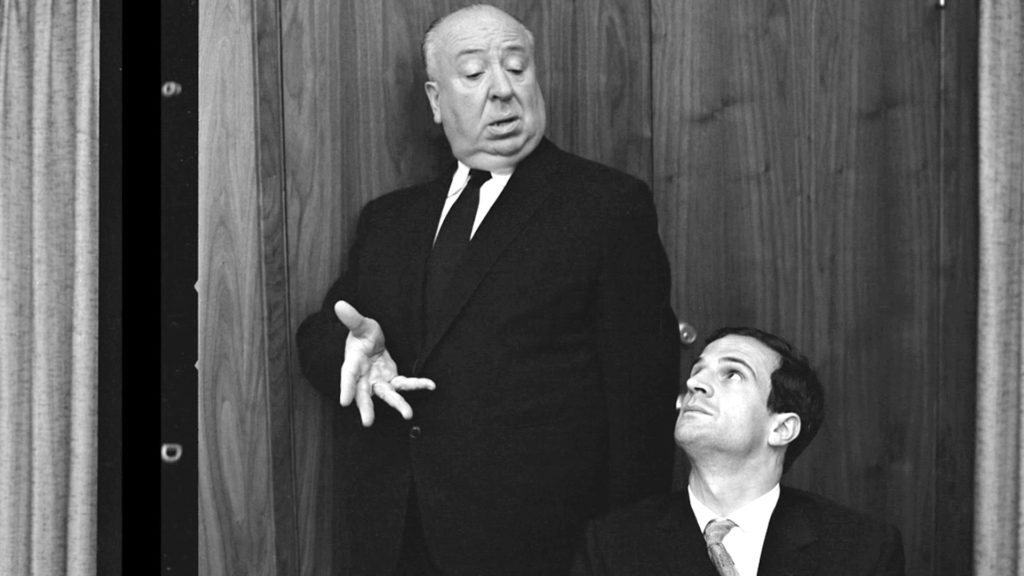Cannes: Hithcock/Truffaut review
 It seems fitting that Kent Jones’ Hitchcock/Truffaut documentary premièred in France, the country whose cineaste culture first embraced Alfred Hitchcock as an artist and not simply an entertainer. Pivotal to this reputation spreading around the world and onto future generations, was Francois Truffaut’s book, Hitchock/Truffaut, a key text for film students, filmmakers and cinephiles in general.
It seems fitting that Kent Jones’ Hitchcock/Truffaut documentary premièred in France, the country whose cineaste culture first embraced Alfred Hitchcock as an artist and not simply an entertainer. Pivotal to this reputation spreading around the world and onto future generations, was Francois Truffaut’s book, Hitchock/Truffaut, a key text for film students, filmmakers and cinephiles in general.
The book takes the form of an annotated conversation, with the directors talking at length about Hitchcock’s films, and very precisely about the way in which he made them. And most importantly, perhaps, why he made them that way. Hitchcock/Truffaut is a book that teaches its readers about filmmaking by guiding them through the processes of one of cinema’s greatest filmmakers.
Jones’ Hitchcock/Truffaut is a wonderful companion piece to the book, and deserves its own place on your shelf. Jones and co-writer Serge Toubiana have found ways in which they can add to the book rather than simply rehash it in a new medium. So while we do get a number of snippets from the book, accompanied by moving pictures this time, there’s a great deal more. It’s almost like discovering a new edition of the book with dense footnotes, additional chapters and lengthy, highly detailed appendices.
Perhaps the most notable addition is a number of interviews with modern directors discussing Hitchcock’s work, the book and many of the subjects discussed in its text. These include, but are not limited to, Martin Scorsese, Wes Anderson, Peter Bogdanovich, Brian De Palma, David Fincher, Richard Linklater, Arnaud Desplechin and Olivier Assayas.
Jones keeps this interview footage very much on topic, with little or no discussion of the directors’ own work. The connections between what they are talking about and their own pictures are obvious, and Jones wisely allows the viewer to draw their own conclusions in this regard.
Some of the filmmakers talk somewhat poetically but occasionally vacuously, and others have a tendency to paraphrase the book rather than speak to it, but the interviews are also peppered with wonderful insights.
Alongside these segments, Jones also tells the story of Hitchcock and Truffaut’s careers and the story of the making of the book. Jones uses audio from Truffaut’s original 1962 interviews, helped out with translation assistance from Helen G. Scott, and includes a wonderful selection of photographs that were taken at the time. He has brought the book to the screen in a way that feels entirely natural, and ensured a smooth flow by following a chronological pattern.
But both Jones and his contributors seem to stumble when it comes to the auteur theory, adhering closely to a focus on Hitchcock as a sole artist. Amongst other oversights, this ensures that Alma Reville becomes a footnote and little more, even despite a brief spoken acknowledgement that she consulted on every film.
This is in keeping with the spirit of the book, for sure, but the reverence which Hitchcock/Truffaut the film displays for Hitchcock/Truffaut the book means that a desirable, maybe even necessary, critical perspective is missing.
Despite this Hitchcock/Truffaut is still a remarkably entertaining and informative work. This will be a firm favourite for cinephiles, especially those who have returned to Truffaut’s book again and again. And for those yet to have read the original text, this film will no doubt make for a perfect introduction.